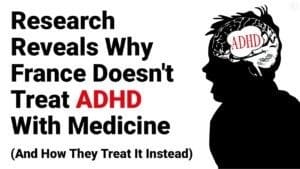Researchers are finding connections between the popular OTC painkiller, acetaminophen, and ADHD in kids.
Acetaminophen, better known by the trademarked brand Tylenol, is a popular over the counter medication. Overall, doctors recommend it commonly. Its popularity is due to its low stomach irritation in comparison to other over the counter medications.
Doctors often recommend it to pregnant women for the following symptoms:
- Back and leg pains
- Cramps
- Headaches
- Low-grade fevers
- Other typical discomforts of pregnancy.
In the most recent years, some began questioning this practice. Studies reveal this popular OTC painkiller taken during pregnancy connects it to ADHD in kids.
History of Acetaminophen
Acetaminophen, as it’s called in the United States and Japan, first came on the scene in 1878 by H.N Morse. Despite several years of testing, it took until the 1950s for it to hit the market. At that time, companies marketed it under the name of Triagesic. They sold as a children’s pain and fever reducer elixir. Currently, is it one of the most popular pain relievers under the brand name of Tylenol or Panadol. Still, the majority of sales are as a generic drug.
Interestingly enough, despite various attempts, scientists have yet to discover how it works. This unknown detail is crucial as it has a reputation as being toxic to the liver and has resulted in hundreds of deaths each year from liver failure.
FDA on Acetaminophen and Pregnancy
Approximately 50-70% of pregnant women worldwide take Acetaminophen to aid them in the pain and discomfort of pregnancy. In 2015, the FDA released a statement regarding multiple pain killers available and their alleged risk factors. The medications reviewed included OTC and prescription Acetaminophen, prescription NSAIDs, and opioids. Studies alleged that each drug could potentially harm the baby or mother when taken during pregnancy. In the case of Acetaminophen, it also found a link to children developing ADHD after mothers took the drug during pregnancy.
The FDA’s statement after evaluating the reports for all of the medications concluded the studies provided demonstrated either inaccuracies or inconsistencies. Therefore, the FDA could not issue a recall or re-evaluation of any of the medicines.
The FDA stated that it was essential that pregnant women have access to pain killers prescribed by their health professionals. It was also necessary that doctors duly informed women of potential complications with each medication. Furthermore, they advised that pregnant women take the lowest dose possible for the shortest duration.
Previous studies linking Acetaminophen to ADHD
JAMA Pediatrics published a study in October of 2016. Evie Stergiakouli, Ph.D. of Medical Research Council, Integrative Epidemiology Unit at the University of Bristol in the United Kingdom, wrote it.
Dr. Stergiakouli and associates analyzed information gathered from 1991-1992 obtained from the Avon Longitudinal Study of Parents and Children. They based findings on a questionnaire given to 7796 pregnant women enrolled in ALSPC, along with their partners and children.
Women completed the questionnaire at 18 weeks, 32 weeks, and when the child was 61 months old. When the children were seven years old, the mothers answered another survey to assess behavioral problems.
The outcome of the questionnaire demonstrated:
- Acetaminophen use by mothers at 18 weeks and 32 weeks showed the children to have an increased risk of having conduct and hyperactivity problems.
- There was an increased risk at 32 weeks of children displaying emotional symptoms and overall difficulties.
Previously, in 2014, JAMA Pediatrics published a similar report. This report analyzed the 64,322 children and mothers who registered in the Danish National Birth Cohort from 1996 – 2002. The data regarding acetaminophen use had been obtained via three separate telephone interviews throughout the pregnancy and six months after birth. This report was looking for data related to ADHD and hyperkinetic disorders.
To ascertain the health of the children, the researchers used behavioral questionnaires given to the mothers, obtained psychiatric records from the Danish National Hospital regarding any hyperkinetic disorders and prescriptions of ADHD medication prescribed from the Danish Prescription Registry. All records were before 2011.
The results of these reports were based on over 50% of the mothers who reported acetaminophen use during pregnancy:
- Children from mothers who used Acetaminophen during pregnancy showed a higher risk of having a hyperkinetic diagnosis, the use of ADHD medication, or demonstrating ADHD similar behavior.
- Results were stronger in women who used Acetaminophen in more than one trimester.
What are the possible connections between Acetaminophen and ADHD
There are a variety of reports similar to these from different countries and universities. From these reports and some mice lab studies, researchers have theorized various reasons behind the possible connection between Acetaminophen and ADHD diagnosis:
- Mothers previously diagnosed with autoimmune or inflammatory disorders which already correlate with neurodevelopmental disorders in children.
- Acetaminophen links to maternal impulsivity. Therefore, if the mothers have a genetic predisposition toward impulsivity, then the Acetaminophen may trigger its release. And that can carry over to the child.
- Some studies suggest an endocrine disruption in the testes of the men, which may play a role in the brain development of conceived children.
- Potential interruption of specific maternal hormones, including thyroid and sex hormones, which play a role in brain development of fetuses.
- Oxidative stress may connect to Acetaminophen and effectively lead to neurons dying.
- Brain-derived neurotrophic factors showed increased levels in mouse models given Acetaminophen, which can create a display of altered behavior.
- Studies indicate that Acetaminophen does cross the placenta barrier and can circulate in the baby’s bloodstream for an extended period.
A more recent study of Cord Plasma linking Acetaminophen and ADHD
In October of 2019, a study was published in JAMA, by a group of doctors, nurses and other associates from the University of John Hopkins University, Bloomberg School of Public Health in Boston, Massachusetts, The Boston University of Medicine and others.
This group of researchers chose to examine potential associations between umbilical cord plasma with markers for acetaminophen use and ADHD, Autism spectrum disorders, and other developmental disorders.
They analyzed 996 mothers and infants who had volunteered in the study at birth and were part of the Boston Birth Cohort. They were followed up by the Boston Medical Center from October 1, 1998, to June 30, 2018.
Samples from the cord were taken, measured, and recorded for three different types of acetaminophen metabolites, or broken down chemicals of Acetaminophen that was metabolized.
Researchers then compared these findings to the children’s records of doctor-diagnosed ADHD, Autism Spectrum disorder, or any other developmental disorder.
The findings
Of the 996 volunteers, of which 558 were male. The results were this:
- 257 of the children had ADHD only
- 66 of the children had Autism Spectrum disorder
- 42 had ADHD with Autism Spectrum disorder
- 304 had other developmental disorders
- 327 were typical
The cord studies indicated that the women taking Acetaminophen during the 2nd and 3rd trimester had an increased risk of the child receiving a diagnosis of ADHD or Autism spectrum. The study also stated that the risk factor also increased as the dose increased.
 Final Thoughts on the Connection Between OTC Painkillers and ADHD
Final Thoughts on the Connection Between OTC Painkillers and ADHD
Taking medications at any time always carries with it some risk, especially when you are pregnant. Yet, physicians till consider Acetominophen the safest pain reliever and fever reducer for pregnant women and children. These recent studies revealing this popular OTC painkiller, when taken during pregnancy, may cause ADHD in kids is alarming.
The studies still warrant more investigation. Therefore, physicians should be advising pregnant women of its possible link. That caution is especially necessary for the second or third trimester.
They should also ensure women understand the risk associated with the dosage as well. Advising women to take the lowest dose possible for the shortest duration may be the most prudent advice. At least, that is, until researchers finish additional studies and provide a more definitive conclusion.












 Community
Community

